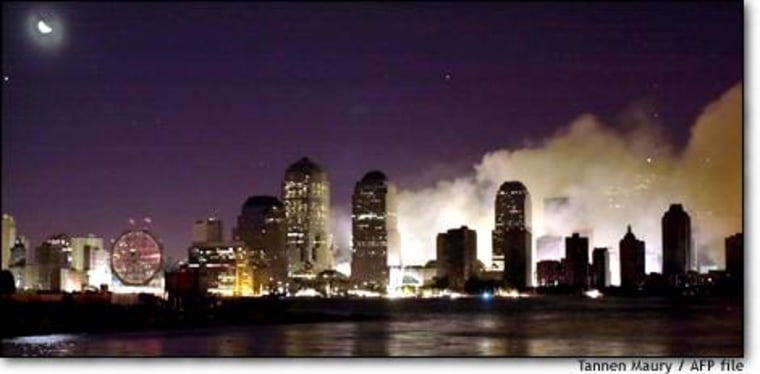It began with a shambles of an election, a self-inflicted black-eye for the nation that holds itself up as a model of democracy. The dot.com economic collapse broadened to include the brick and mortar mainstream. In foreign policy, Washington washed its hands of the Middle East and clashed with China over sky planes and Russia over missile defense. The American media kissed the scandals of the Clinton era goodbye and jumped, flealike, onto a new host named Gary Condit. Just when a decent person thought it couldn’t get much worse, it got much, much worse.
AT THE MOMENT, it would be difficult to find many people who will mourn the passage from 2001 to 2002. “Good riddance” seems an appropriate sentiment for the year of Sept. 11, the year when tragedy and evil combined to yank boastful arrogance out of “the world’s only superpower.” The United States ended “the American Century” riding on a bubble of economic exuberance, cultural hubris and geo-political blindness. Has 2001 removed the blinders? I think it has, but I would imagine that something similar was written in 1898, 1917 and 1941. There’s no guarantee in our attention-deficit culture that the lessons of this miserable year will be absorbed.
THE LONG VIEW
America should see the march of time this year as a mixed bag. The country must focus on the tasks at hand: the war launched to avenge the attacks - and more importantly, to prevent further atrocities; the efforts to rethink domestic security; the funerals and memorial services, now slowing here in New York as the awful work of exhuming the dead gives way to more mundane digging at ground zero.
We should also feel pride at the way that the United States rose to the challenge presented by Sept. 11’s terrorists. This should be a reservoir of optimism for the enemies of evil everywhere.
Less clear, however, is the depth of the nation’s commitment to a new world view that includes the activist foreign policy that will be needed to meet the 21st century’s threats. So far, in Afghanistan, the United States has been operating with the sympathy of much of the world. A nation attacked has the right to strike back. American foreign policy before Sept. 11 had enormous flaws, but none of them justified the murders of that day.
But striking back at the perceived perpetrators is the easy part. If we look at this properly, then it is clear the United States has to devise a doctrine with international support that would have allowed American armed forces to attack Afghanistan in 1999, not in 2001. Some counterterrorism experts (and this column, by the way) had argued for a more active stance toward al-Qaida and their Taliban hosts ever since the attack on the U.S. embassies in East Africa in 1998. The political will and theoretical framework that would have allowed such an intervention when it was really needed simply did not exist. Forging such a doctrine out of the ashes of Sept. 11 should be the number on long-term priority of the U.S. foreign policy.
NEW INTERNATIONALISM
There isn’t much evidence that such a systemic change in the way the United States approaches the world is in the works. In part, this may reflect the very clear need to focus most of the government’s resources on war and security.
Behind the scenes, though, and in subtle ways publicly, the United States should be laying the ground work for a new kind of internationalism - one that finally ends America’s the stupid feud with the United Nations and works instead to remake that organization as the guarantor of state culpability.
The old Left vs. Right argument in the United States about the U.N. is completely discredited today. Put simply, the Right loathes the U.N. as the international version of “big government.” The Left defends it as the utopian vision of world democracy. For a long while now, neither has been true.
The reconstruction job now being contemplated in Afghanistan is a perfect example of what’s wrong with the Right’s argument. The term “nation building,” once an expletive in Washington, is now in style again. It has to be. If we’ve learned anything from Sept. 11, it is that the “foreign rat holes” Jesse Helms like to shun are even more dangerous if they are allowed to collapse into anarchy.
But who is going to do it? The United States, rightly, say it has other rat holes to plumb. NATO really isn’t thrilled about the idea of becoming the guys with brooms that follow the American horse parade. And so, inevitably, it is the United Nations that makes sense.
At the same time, though, the Left’s vision of the United Nations as a place where the greatest and least nations of the planet can meet and debate issues on equal terms also is bankrupt. It has been for decades, of course, and the U.N. Security Council, where the “great powers” make the organization’s most important decisions, is institutionalized proof of this. But the United States and its allies need to make it clear that the United Nations founded in the aftermath of a mid-20th century war is not suitable for the needs of the early 21st century. The idea that colonialism would give way to stable, responsible states has been shown to be an illusion. In too many places, it gave way to plunder, ethnic slaughter and worse. This is the growth medium for terrorism, and responsible nations need to be able to act.
CLEAR AND PRESENT DANGER

It is far too easy to look at the U.N. system and blame it for the half-assed efforts of the 1990s to deal with places like Somalia, Bosnia, Sierra Leone or Afghanistan. The U.N. is the sum of its parts, and the United States is, by far, its largest part.
Ironically, because of the political pissing match over yearly dues that dominated U.S.-U.N. relations in the 1990s, some of the changes that might have made the organization more useful have been blocked by American influence. For instance, in the early 1990s the U.N. suggested that, perhaps, it might be a good idea to have a standing force of trained international police, the kind of force that would follow the a victorious intervention force into a place like Afghanistan and take up the job of training a civil police force and provide security in the meantime. But the GOP’s black helicopter crowd shook in its boots at the notion of “world government” and killed the idea.
BATTLES AND WARS
The Bush administration has made enormous progress in mending poor relations with Europe and Russia and, to some extent, repairing ties with China.
These may seem like secondary issues with U.S. troops on the ground in Afghanistan. But they are not. Long-term, these are the nations that will either transform the world’s collective security system or allow it to collapse into such disrepair that unilateral American action will be the only alternative in every situation. And if that happens, no number of victories in the mountains of Afghanistan can help us. It’s the difference between winning the battles and winning the war.
For anyone with direct connection to the attacks that killed so many, the stroke of midnight Monday invariably will carry multiple vibrations: the end of a long period of mourning, perhaps, and a holiday season marred by absent loved ones. But it also will be a beginning, a chance to remake life armed with the wisdom and perspective of so may lives so tragically cut short. America as a nation has this same opportunity. The coming year will be difficult and it may bring more tragedy. But the greatest tragedy would be for America succumb to temptation and declare victory too soon.
Happy New Year. God knows, we need one.
